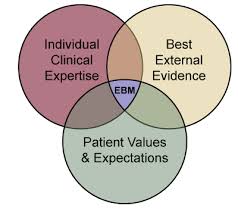Evidence-based practice (EBP). What is it? Take a look at the graphic above. According to American Psychological Association and the Institute of Medicine, there are three components: (1) the best evidence; in combination with (2) individual clinical expertise; and consistent with (3) patient values and expectations. Said another way, EBP is a verb. Why then do so many treat it as a noun, continually linking the expression to the use of specific treatment approaches? As just one example, check out guidelines published for the treatment of people with PTSD by the National Institute for Clinical Excellence (NICE)–the U.K.’s equivalent to the U.S. Substance Abuse and Mental Health Services Administration (SAMHSA). Despite the above noted definition, and the lack of evidence favoring one treatment over another, the NICE equates EBP with the use of specific treatment approaches and boldly recommends certain methods over others.
Not long ago, ICCE Senior Associate, and U.K.-based researcher and clinician, Bill Andrews, addressed the problems with the guidelines in a presentation to an audience of British practitioners. He not only addresses the inconsistent use of the term, evidence-based practice, in the development of guidelines by governing bodies but also the actual research on PTSD. After watching the clip, take some time to review the articles assembled below, which Bill cites during his presentation. The main point here is that clinicians need not be afraid of EBP. Instead, they need to insist that leaders and officials stick to the stated definition–a definition I’m perfectly content to live with mas are most practitioners I meet. To wit, know what the evidence says “works,” use my expertise to translate such findings into practices that fit with the values, preferences, and expectations of the individual consumers I treat.
Click here to read the meta-analysis that started it all. Don’t stop there, however, make sure and read the response to that study written by proponents of the NICE guideliness. You’ll be completely up-to-date if you finish with our response to that critique.


[…] Evidence-based Practice is a Verb not a Noun – Scott D. Miller, Ph. D. […]